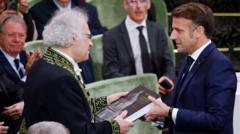Forty years after its initiation and nearly four centuries post its original commission, the latest edition of the Dictionnaire de l’Académie Française was officially introduced to President Macron in a ceremonial event at the 17th-century Collège des Quatre-Nations. This new edition, dubbed the ninth, culminates the efforts of the "immortals," who are distinguished members of the French Academy founded by Cardinal Richelieu in 1635, aimed at refining and preserving the French language.
Historically, the dictionary's creation has been a slow and meticulous process. The first edition was only completed in 1694, and the latest iteration has taken over thirty years to generate, igniting debates about its relevance in today’s fast-paced linguistic landscape. A group of linguists criticized the prolonged effort as "praiseworthy," yet ultimately "excessively tardy," questioning its usefulness in modern times.
The ninth edition supersedes the eighth, completed in 1935, and includes approximately 21,000 new entries, reflecting contemporary language use since the 1950s. However, in a sign of the dictionary’s struggle to adapt, it includes terms like "soda," "sauna," and "yuppie" that now seem out-of-date. Current buzzwords such as "tiktokeur," "vlog," "smartphone," and "émoji," commonly found in other online dictionaries, are noticeably absent.
The compilation attempts to modernize its approach by incorporating gender-neutral terms for job titles, denoting a shift in societal norms. Yet, earlier sections lack these updates, given the Academy's historical resistance to reforms in gender linguistics. Notably, the definition of marriage in the “M” section continues to restrict itself to a man and woman, despite the evolving legal and social definitions in contemporary France.
Critics lament the inability of the dictionary to serve as a reliable reference in an age where online platforms are more dynamic and comprehensive. Under the leadership of writer Amin Maalouf, the committee meets weekly to debate definitions drafted by external experts, yet their pace struggles to keep up with the evolving language landscape. Some members, like English poet Michael Edwards, have even advocated for the revival of obscure terms, emphasizing the need for further linguistic adaptation.
As discussions are already underway for edition ten, the future of the Académie Française remains uncertain, and its standing as the arbiter of the French language faces increasing scrutiny from a rapidly changing world.



















